New study conducted by the University of Pittsburgh demonstrates the high prevalence of sleep problems and interrupted sleep in menopausal women and those women suffering from trauma as children or adults.

‘The study highlights the adverse sleep sequelae of trauma exposure in midlife women, demonstrating that childhood and adult trauma are related to poor objective sleep continuity and subjective sleep quality, independent of sleep risk factors and depressive symptoms.’





The study involved 166 women who were aged around 40 to 60 years at baseline and primarily tested whether trauma exposure during childhood or adulthood resulted in persistently poor sleep quality in midlife.44% of the total study participants reported childhood trauma, and 60% of the participants reported experiencing trauma as an adult. The most common sleep-related problems noted within the group were actigraphy-measured short sleep duration and waking after the onset of sleep(WASO) as well as self-reported poor sleep quality.
Researchers noted that childhood trauma was most related to persistently poor WASO, whereas adult trauma was most related to poor sleep quality. Both types of trauma were not related to persistently poor sleep duration.
"This study provides further support that poor sleep is common in midlife women," said Dr. Karen Jakubowski, a postdoctoral scholar in the Department of Psychiatry at the University of Pittsburgh and a lead author of the study.
Dr. Jakubowski will be presenting the results of her study, "Trauma and sleep problems over midlife in women," during the 2020 NAMS Virtual Annual Meeting.
Advertisement
Advertisement












